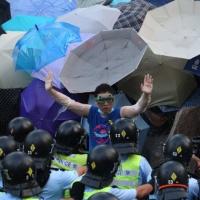
Mass struggle needs genuine internal democracy and fighting working class programme to defeat dictatorship
The epic ‘Umbrella Revolution’ has raged for seven weeks, now holding out for longer even than the historic Tiananmen Square mass movement that was crushed in 1989. The current Hong Kong protests constitute the most serious challenge to the Chinese dictatorship (CCP) and the Hong Kong capitalist elite since the Beijing events of a quarter century ago.
The demands of the mostly youthful protesters for free elections have won massive support in society. At the same time, the movement reflects explosive social discontent in Hong Kong, one of the most unequal societies on the planet. In a Reuters poll conducted in October, 38 percent of those at the three protest sites cited ‘wealth inequality’ as a major reason for joining the struggle. Nor is this a ‘student movement’ as widely portrayed in the media. The same poll found that only one in five of under-30s in the occupied areas are students.
At the time of writing a new offensive is being prepared by Hong Kong’s unelected government with the imminent launch of a mass police clearance exercise. With 7,000 police on standby and high court judges deliberating over the exact wording of court injunctions to clear the occupied sites, this attack could take place within hours. This follows a three week hiatus in which the government has played a waiting game, while stepping up its psychological warfare against the protests. Orders to cool things undoubtedly came from Beijing and China’s ‘supreme leader’ Xi Jinping, who did not want his prestigious APEC summit, attended by 22 government leaders including Obama, to be upstaged. With the APEC banqueters returning home the signal has now been given for the ‘gloves to come off’ in Hong Kong.
Previous police assaults on the protest sites have triggered a powerful backlash, with thousands mobilising, forcing the government and the state to step back. However, this time the outcome is less certain given evident splits and a crisis of leadership within the protest movement.
Socialist Action, the Hong Kong supporters of the Committee for a Workers’ International (CWI), have consistently criticised the bourgeois democratic politicians (pan democrats) and their NGO allies that currently set the political tone within the democracy struggle. These groupings are tied politically to the coat tails of the capitalist class and therefore, given the interests of capitalism in the current dictatorial system in China, expound a very partial reform programme that studiously avoids calling for the overthrow of the dictatorship or spreading the democracy struggle into China. Unfortunately, while in the course of the current mass movement the grip of these compromise leaders has been shaken and widely questioned, with other groups such as the students emerging in a bigger role, these newer forces have continued to follow the mistaken political strategy of the ‘pan-democrats’, rather than rejecting it for a class struggle orientation that seeks to ignite an even bigger movement inside China against the CCP dictatorship.
Background
An article published in the Socialist《社会主义者》magazine (the Chinese language magazine of the CWI) in May-June 2013, explains the approach of Marxists to the mass struggle in Hong Kong and the role of the pan-democratic leaders. This was written shortly after the launch of the ‘Occupy Central’ campaign and, while welcoming the proposal for occupation, takes up the political and organisational weaknesses in the OC leaders’ concept of struggle.
As we warned at that time, “The ‘moderate’ pan-democratic parties are mainly using ‘Occupy Central’ to secure their own positions as powerbrokers in the coming struggle… These leaders fear mass struggle, which can push them further than they want to go, and even sweep them aside in favour of more resolute forces.” In fact, this is what happened when the ‘Umbrella Revolution’ erupted in September, sidelining the OC leaders as a punishment for their repeated refusal to start the occupation struggle, consigning them to history as a campaign that only ever fired blanks. Currently, the main debate among the OC tops seems to be how and when they will surrender themselves at police stations for supporting an ‘illegal’ protest movement!
As the article warned, “The ‘moderate’ pan-democratic leaders have consistently underestimated what is needed to achieve universal suffrage in Hong Kong… An occupation on its own will not be enough to force the Chinese regime to retreat.” From the outset, Socialist Action supporters called for the occupation campaign, “to become a platform from which to launch even more effective forms of mass resistance. These include strikes and calls for solidarity action from beyond Hong Kong’s borders.”
Crucially we have explained that, “If the democratic struggle in Hong Kong is isolated to Hong Kong (as today’s pan-democratic leaders want), and refuses to actively link-up and support mass anti-authoritarian struggle in China, it cannot succeed.”
As the Hong Kong struggle enters a more complex and difficult phase, with considerable dangers present, there are vital lessons that need to be discussed and absorbed in order to go forward.
Read the article mentioned above as vital background analysis. It follows this update on the Chinaworker web-site here http://chinaworker.info/en/2014/11/17/8583/ under the title The great debate about Occupy Central by Dikang, Socialist Action.


Be the first to comment